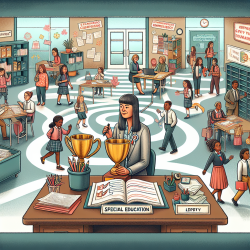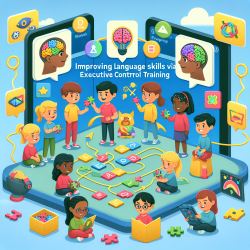Introduction
As a practitioner dedicated to improving outcomes for children, understanding the unique challenges faced by students with Autism Spectrum Disorders (ASD) during their first year of college is crucial. The research article "Students with Autism Spectrum Disorders and Their First-Year College Experiences" provides valuable insights into the experiences of these students compared to their peers with learning disabilities (LD). By leveraging these findings, practitioners can better support students with ASD in their transition to higher education.
Key Findings from the Research
The study highlights several important differences between first-year college students with ASD and those with LD. Notably, students with ASD are less likely to engage in risk-taking behaviors and are less likely to use health services and writing centers. Additionally, students with ASD often report higher intellectual self-confidence but lower social self-confidence compared to their LD peers.
Understanding these differences can help practitioners tailor their support strategies to address the specific needs of students with ASD, fostering a more inclusive and supportive college environment.
Practical Strategies for Practitioners
Based on the research findings, here are some practical strategies that practitioners can implement to support students with ASD in their first year of college:
- Promote Self-Disclosure: Encourage students with ASD to disclose their disabilities to access necessary accommodations and support services. Educate them on the benefits of disclosure and provide guidance on navigating the process.
- Enhance Social Supports: Develop peer mentoring programs and social skills workshops to help students with ASD build social connections and improve their communication skills.
- Facilitate Access to Resources: Ensure that students with ASD are aware of available resources, such as disability services, counseling, and academic support programs. Provide clear instructions on how to access these services.
- Foster Faculty Awareness: Conduct training sessions for faculty and staff to increase awareness of ASD and promote inclusive teaching practices. Encourage faculty to engage with students with ASD and provide support tailored to their needs.
Encouraging Further Research
While the current study provides valuable insights, further research is needed to explore the diverse experiences of students with ASD in higher education. Practitioners are encouraged to engage in ongoing research to better understand the specific challenges faced by these students and develop evidence-based interventions to support their success.
Conclusion
Supporting students with ASD in their transition to college requires a comprehensive approach that addresses their unique needs. By implementing the strategies outlined above and staying informed about the latest research, practitioners can play a vital role in helping these students achieve their academic and personal goals.
To read the original research paper, please follow this link: Students with Autism Spectrum Disorders and Their First-Year College Experiences.










